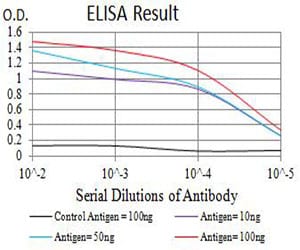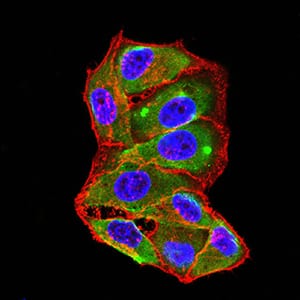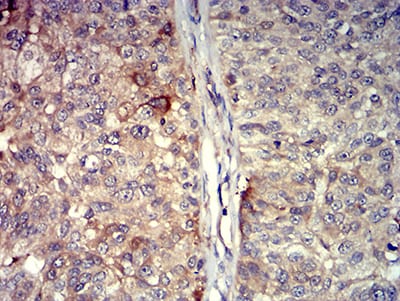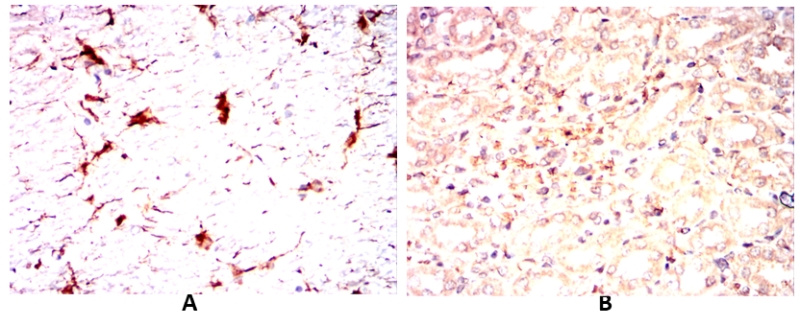








| WB | 1/500 - 1/2000 | Human,Mouse,Rat,Rabbit |
| IF | 咨询技术 | Human,Mouse,Rat,Rabbit |
| IHC | 1/100 - 1/500 | Human,Mouse,Rat,Rabbit |
| ICC | 1/50 - 1/500 | Human,Mouse,Rat,Rabbit |
| FCM | 1/200 - 1/400 | Human,Mouse,Rat,Rabbit |
| Elisa | 1/10000 | Human,Mouse,Rat,Rabbit |
| Aliases | CD254; ODF; OPGL; sOdf; OPTB2; RANKL; TNLG6B; TRANCE; hRANKL2 |
| Entrez GeneID | 8600 |
| clone | 8A7B9 |
| WB Predicted band size | 35.5kDa |
| Host/Isotype | Mouse IgG1 |
| Antibody Type | Primary antibody |
| Storage | Store at 4°C short term. Aliquot and store at -20°C long term. Avoid freeze/thaw cycles. |
| Species Reactivity | Human,Mouse,Rat,Monkey,Rabbit |
| Immunogen | Purified recombinant fragment of human TNFSF11 (AA: 74-308) expressed in E. Coli. |
| Formulation | Purified antibody in PBS with 0.05% sodium azide |
+ +
以下是3篇关于TNFSF11(RANKL)抗体的代表性文献摘要:
---
1. **文献名称**: *"Denosumab for prevention of fractures in postmenopausal women with osteoporosis"*
**作者**: Cummings SR, et al.
**摘要**: 该研究报道了抗RANKL单克隆抗体Denosumab在绝经后骨质疏松症患者中的Ⅲ期临床试验结果,证实其通过抑制破骨细胞活性显著降低骨折风险,且安全性良好。
2. **文献名称**: *"Osteoprotegerin ligand is a cytokine that regulates osteoclast differentiation and activation"*
**作者**: Lacey DL, et al.
**摘要**: 首次阐明TNFSF11(RANKL)在破骨细胞分化中的核心作用,并证明其抗体可阻断RANKL-RANK信号通路,为开发骨代谢疾病治疗策略奠定理论基础。
3. **文献名称**: *"RANKL inhibition in the treatment of bone metastases"*
**作者**: Body JJ, et al.
**摘要**: 探讨Denosumab在实体瘤骨转移患者中的应用,显示其通过靶向RANKL有效减少骨骼相关事件(如病理性骨折),疗效优于传统双膦酸盐类药物。
---
如需更具体的文献或领域细分(如自身免疫病、结构生物学研究),可进一步补充说明。
TNFSF11. also known as receptor activator of nuclear factor kappa-B ligand (RANKL), is a transmembrane protein belonging to the tumor necrosis factor (TNF) superfamily. It plays a critical role in regulating bone metabolism, immune cell differentiation, and lymph node development by binding to its receptor RANK. Dysregulation of the RANKL/RANK signaling pathway is implicated in pathological conditions such as osteoporosis, inflammatory bone loss, and cancer-related bone metastases.
TNFSF11 antibodies are therapeutic or research tools designed to inhibit this pathway. The most well-known example is denosumab, a monoclonal antibody approved for treating osteoporosis, bone metastases, and giant cell tumors. These antibodies block RANKL from interacting with RANK, thereby suppressing osteoclast formation and activity. This mechanism reduces excessive bone resorption, preserving bone density and preventing skeletal complications.
In research, TNFSF11 antibodies are used to study bone remodeling, immune regulation, and cancer progression. Recent studies also explore their potential in autoimmune diseases and chronic inflammation. Challenges include balancing therapeutic efficacy with immune suppression risks. Overall, TNFSF11 antibodies represent a pivotal advancement in targeting molecular pathways underlying bone and immune disorders.
×